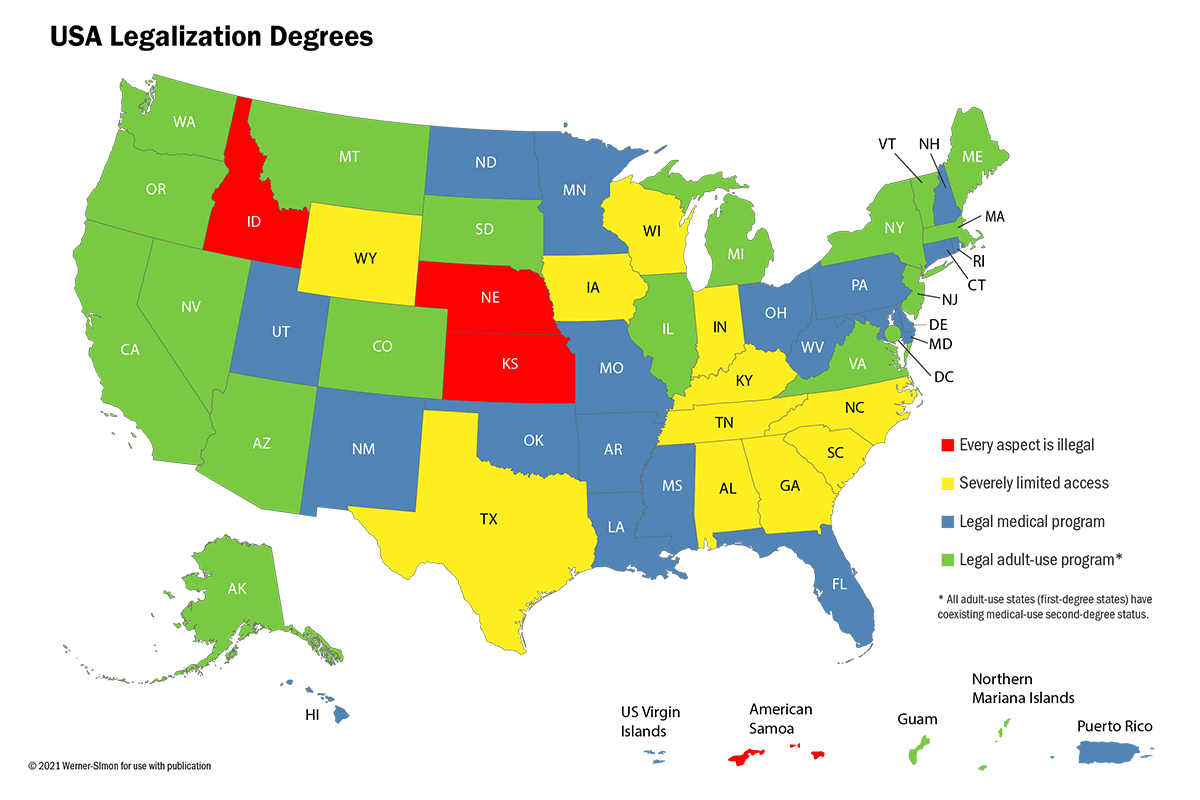(Editor’s note: This story is part of a recurring series of commentaries from professionals connected to the cannabis industry. Julie A. Werner-Simon is law professor adjunct at Drexel University’s School of Law, a legal analyst for the “Cannabis as an Emerging Business” class at Drexel’s LeBow School of Business and a former federal prosecutor. This is the third installment of a three-part series. Part 2 detailed the U.S. areas where cannabis is still entirely illegal.)
With New York’s governor signing adult-use marijuana into law this week, that state joins the growing ranks of U.S. markets legalizing first-degree marijuana usage (as depicted in green in the map above).
That development continues the trend of states reversing marijuana prohibition across the country, following on the heels of a letter to the White House last week where 30 Democratic lawmakers urged President Joe Biden to reconsider the decision to fire five White House staffers for marijuana usage.
The White House Press Secretary jumped into the fray with a tweet downplaying the controversy:
As a result, more people will serve who would not have in the past with the same level of recent drug use. The bottom line is this: of the hundreds of people hired, only five people who had started working at the White House are no longer employed as a result of this policy.
— Jen Psaki (@PressSec) March 19, 2021
Conjecture on the reasons for the dismissals includes that the particular employees (who each had to complete lengthy, detailed security clearance forms under penalty of perjury) might have submitted forms that contained, among other things, inconsistencies or misstatements about when they last used marijuana.
The firing squabble exemplifies federal-state differences over marijuana: Usage remains a federal crime regardless of state legality.
For more than a half-century, it has been illegal for federal employees to use marijuana, and staffers on Day One are informed of policy memoranda explicitly prohibiting use of marijuana and other drugs.
Additionally, employees with security clearances are warned that even low-THC CBD products could result in personnel consequences.
Executive-branch department and agency heads have been almost universally authorized to justify hiring and firing decisions for reasons that include marijuana use.
But despite the recent White House dismissals, a hint of under-the-radar thawing is afoot.
Marijuana use no longer necessarily ‘incompatible’
On Feb. 28, 2021, the acting director of the U.S. Office of Personnel Management (OPM), Kathleen M. McGettigan, issued a new marijuana policy directive with little fanfare.
Until the firings, the OPM policy memo was seemingly noted only by the community of federal employees, and the event generated minimal coverage in a national newspaper.
The memo changed (ever-so-slightly) the factors the federal government can consider vis-a-vis who is hired and who can be fired in the federal workforce.
The OPM’s McGettigan characterized the memo as one providing “updated guidance” to federal agencies about the impact of an “individual’s marijuana use” on federal employment “suitability” considerations.
She frontloaded the change of position with an articulated reliance on a recent nationwide study that revealed nearly half of all American adults have admitted marijuana use.
Then, noting the ever-increasing number of states with recreational (first-degree) regimes and those with medical marijuana (second-degree) programs, McGettigan announced that use of this particular federally illegal substance (marijuana) would not automatically mean that “individuals (are) unsuitable for federal service.”
No longer would a marijuana possession offense necessarily be “incompatible” with federal employment.
The OPM memo explicitly stressed it was not addressing security-clearance determinations and included language delineating “recently discontinued marijuana use” from “ongoing marijuana use.”
But even with those qualifiers, the memo nudged open the federal door by a small measure.
Not necessarily a disqualifier
Days later, on March 2, 2021, the Federal Managers Association (FMA) – a professional association for roughly 200,000 managers and supervisors of the federal workforce – issued a three-page printable “news update.”
The update went viral among federal employees – even those who were not supervisors. The headline atop a stock photo of a sea-of-green marijuana plants seemed to shout the words: “OPM Memo States Marijuana is Not a Disqualifier for Federal Employment.”
The news report’s opening sentence reads as follows: “. . . (c)andidates for federal employment should not be barred from federal employment on the sole basis of marijuana use.”
What might 2021 bring?
While those are positive developments in the U.S., times seem to be changing internationally as well.
On the first day of the new year, England’s news service, the BBC, reported that 2021 might be the world’s turning point for addressing climate change.
High up on the list of reasons given for the prognostication included the COVID-19 pandemic, “which has shaken our sense of invulnerability.”
The BBC report explained that COVID-19 has delivered “an economic shock” around the world and that governments now were seeking ways to “reboot their economies” to include investment in renewable energy.
It might not only be global warming that is tackled in 2021.
Marijuana’s economic “rebooting” prowess in the U.S. states that have legalized is well-documented. Marijuana sales have soared during America’s year of shutdowns and home-confinement.
So, once COVID-19’s deadliness is significantly reduced and after the vaccine is made available to and in the arms of a majority of Americans – hopefully, come summer – it could be marijuana’s federal moment.
Marijuana might be just what the doctor ordered to bring us back to fiscal health.
Julie A. Werner-Simon is a legal analyst for the “Cannabis as an Emerging Business” class at Drexel’s LeBow School of Business. She can be reached at controlledsubstancesact@gmail.com.
Part 1 of this series is available here, and Part 2 of is available here.
To be considered for publication as a guest columnist, please submit your request to editorial@mjbizdaily.com with the subject line “Guest Column.”





